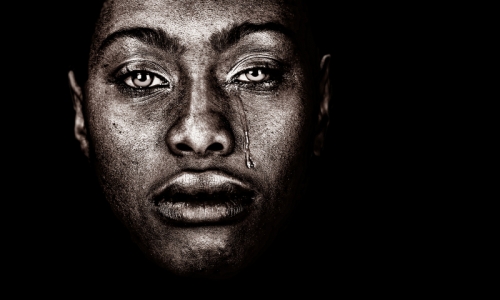We are all too aware of the recent tragedies among the African American community, more recently the senseless murder of George Floyd . . . an act that has stirred up a lot of anger and sorrow over the last few weeks. Though I am deeply grieved by what is going on in our country, I cannot help but wonder if God has allowed these things to transpire for a greater purpose. Is He trying to highlight the suffering, inequalities, and injustices that are still occurring, SO THAT we would be stirred to right the wrongs from our past? But if that is the case, how do we reconcile and pave a new way forward together?
My dad used to say with sadness, “11 am Sunday mornings is the most segregated hour of the whole week.” We work together, go to school together, and even go to parties or sporting events together . . . but then segregate to worship - this should not be!
Martin Luther King Jr. had a dream that one day the sons of former slaves and the sons of former slave owners would be able to “sit down together at the table of brotherhood.” Though we have made great strides since the civil rights movement, recent events prove that our nation has not accomplished true kinship across racial divides. King taught that true brotherhood comes from faith - he knew the government would never be able to mandate policies that fix race relations. The real solution comes down to a change of heart. In the end, any steps toward change must be rooted in love if they want to impact society in meaningful ways.
We can glean so much from Father Gregory Boyle’s wisdom on this topic. Boyle served as the pastor of the poorest parish in Los Angeles for many years, and eventually founded Homeboy Industries, the largest gang-intervention, rehabilitation, and re-entry program in the world. His thoughts on kinship with the poor apply well to race relations too – especially in the face of the recent riots. He put it well when he said,
You stand with the least likely to succeed until success is succeeded by something more valuable: kinship. You stand with the surly, the belligerent, the badly behaved until bad behavior is recognized for the language it is: the vocabulary of the deeply wounded and of those whose burdens are more than they can bear. . . What we need in the world is a compassion that stands in awe at the burdens the poor have to carry rather than stand in judgment at the way they carry them. . . Compassion is not a relationship between the wounded and the healer. It is a covenant between equals. Kinship: not serving the other but being one with the other. . . There is no ‘them’ and ‘us.’ There is only us. . . If we love what God loves, then, in compassion, margins get erased. Be compassionate as God is compassionate means dismantling the barriers that exclude.
"There is no longer Jew or Gentile, slave or free, male and female. For you are all one in Christ." Galatians 3:28
So practically how can we dismantle the barriers that exist between races and tear down the strongholds keeping our communities isolated and in bondage? Dr. Ben Carson suggests people simply examine their own sphere of influence and start by being Christlike with those people: neighbors, co-workers, or daily acquaintances. (REF 3) No matter what color you are, you make a difference when you choose kindness. We are all either part of the problem or part of the solution; either way our actions (or lack of) will cause a ripple effect into society. WE get to choose what legacy we leave in our path.
How are people affected through the generations? Does epigenetics play a role in inheriting our ancestor’s trauma?
Epigenetics is the science of gene expression; it is the interface between nature (the genes you inherited from your parents) and nurture (your life experiences). Though your genetic code (DNA) cannot be changed, the expression of your genes can change based on many different factors. Epigenetics explores chemical tags on DNA that have the ability to turn genes on or off. Research indicates that individuals who have been harmed by trauma in their life, resulting in epigenetic changes to their genome, may be able to pass those genetic alterations down to their offspring. (REF 1) These studies can sometimes create more questions than answers, so there is ongoing research in attempt to better understand the molecular mechanisms by which these tags are inherited. (REF 8)
Randy L. Jirtle, an epigenetics researcher at North Carolina State University describes the epigenome as a type of software that runs on the computer-like cell. He explains that the epigenome can affect lots of different cells, just as a software program can be run on many different computers. “The stress on the system moves the machinery to put down or not put down epigenetic markers.” (REF 6) Trauma can imprint a chemical mark on an individual’s genes, and this alteration can then be passed down to subsequent generations. The mark doesn’t directly damage the gene; there’s no mutation. Instead it modifies the mechanism by which the gene is converted into functioning proteins, or by which it is expressed. The alteration is not genetic - it is epigenetic. (REF 7)
A study in the Proceedings of the National Academy of Sciences found that “the sons of Union Army soldiers who endured grueling conditions as prisoners of war were more likely to die young than the sons of soldiers who were not prisoners. This is despite the fact that the sons were born after the war, so they couldn’t have experienced its horrors personally. In other words, it seemed like the stresses of war were getting passed down between generations.” (REF 6) Epigenetic links have also been established in animal studies. For example, mice that have been taught to fear the smell of cherries when it was paired with an electric shock had children and grandchildren that also showed signs of anxiety when exposed to the odor, even though they had never “learned” the painful association. (REF 6)
Studies like this hint at the heritability of trauma, and if these studies are correct, they would suggest that we inherit some trace of our parents’ and even grandparents’ experience . . . particularly their suffering (which can in turn modify our own day-to-day health — and perhaps even our children’s too). (REF 7) Corporate memory of past injustices becomes part of the painful history that subsequent generations learn about and continue to live through. Memories breed resentment, fear, and hatred and result in recriminations, when unresolved.
Could this be the what Scripture refers to as generational sin, (Numbers 14:18, Exodus 20:5-6)? Even if we did not choose the sin, can we be victims of our forefather’s sins (or those committed against them)? You can read more about generational sin in these articles: HERE and HERE.
I bring this up because it begs the question, could the trauma of slavery (on the victim) and the sin of racism (from the perpetrator) both pass on negative effects to subsequent generations? (REF 6) And if so, what can we do about it?
My story
Years ago, I was reading a book about trauma that stated, “we are still responsible for our sinful response to the sins committed against us.” Wait, seriously? Even when WE were the ones wronged? I stopped and reread that sentence over and over. Suddenly I realized that I had hardened my heart and judged an individual for the way they treatment me, and as a result, I was reacting in anger towards this person (and any other person that acted in a similar manner). Because my pain was not validated by others, without realizing it, I developed a defense response (or trigger) that put up a self-protective wall through my harsh reactions.
I had already chosen to forgive the individual who hurt me, but my heart still felt the pain of the experience. This time I decided I would ask God to forgive ME for my sinful reactions toward this person and then ask Him to purify my heart moving forward.
To help me heal from the wounds inflicted on me by this individual and help me embrace the fullness of my forgiveness, a trustworthy friend “stood in the gap” for me. She offered to do an exercise with me called identificational repentance. In this practice, someone else assumes the role of the offender and asks the wounded person if they would forgive them for what they did. As the Lord led my friend, she asked me to forgive her individually for different details of the offense (i.e. not validating my feelings, not acknowledging my pain, not affirming my true value, not responding in love when I was hurting, etc.). As she did this, my tears began to flow. I chose forgiveness again . . . but this time something different happened in my heart. My forgiveness did not feel like just an act of my will (or submission to God’s directives); this time it was accompanied with a release, one that brought a deep peace within.
What can we learn from this and how does it apply now?
Sin affects the victims and their subsequent generations and history will continue to repeat itself unless we find ways to listen to it, locate where it is happening, and find healing and forgiveness for its consequences.
God holds His covenant people accountable for sin . . . individually and corporately; they both require repentance and forgiveness. Thank God, the death of Jesus changed everything. We do not have to suffer under the effects of generational sin anymore . . . but we still must account for it. If we identify with the historical sins, repent and release forgiveness, we can weaken any related strongholds. This is how we break the repetitive cycle of historical sin.
One way we can do this is by standing in the gap for each other, as my friend did for me. Intercessors standing in the gap can take responsibility for and identify with the sin of the people to which they belong, even centuries after the original acts. “Strategic prayer known as ‘representational confession’ makes reconciliation and renewal possible for families, churches, communities, tribes, and nations.” (REF 2)
The best examples of this in the Old Testament are Nehemiah (Nehemiah 1:4-7), Jeremiah (Jeremiah 14:20), and Daniel (Daniel 9:4-20). None of these men were necessarily committing the sins they were confessing, but as leaders, they representatively identified with and confessed the sins of their people. God heard and God responded.
The blood of Jesus has paid the price for all our sin once and for all but accessing and applying its power falls to those who take responsibility for the guilt and ask forgiveness based on His completed work at the cross. (REF 2)
When we are given an inheritance (in the natural) we have to CLAIM that inheritance in order to access it and benefit from it. It is the same with our spiritual inheritance of healing and freedom. When Christ died for us, He left us an inheritance that ALL believers can access (Matthew 16:9) . . . but we must believe it, claim it, and apply it to our lives in order to experience the fullness of this gift (John 10:10).
We need God’s sorrow and His revelation in order to intercede adequately. We need to know the right time, the right place, and before the right people in order for that repentance to be effective. I believe the time is now. I believe God is allowing the stirring of racial tensions FOR OUR GOOD, for the healing and reconciliation of His people.
Our nation was founded by white supremacists and built on the backs of black slaves (see video link at end of article). It is time for our nation to repent of our sins of slavery and racism and to take tangible steps to right these wrongs. The current events are simply paving the way for this intercession and healing to occur. Our job is to respond . . . whether individually or corporately. One way we can to this is by removing the monuments in our nation that honor the confederacy and white supremacists (join the movement - link at bottom of article). This is at least a start.
"Our repentance must occur in horizontal relationships as well as vertical (with our heavenly Father). We need to have face-to-face contact with those who are the victims of past sin. Just as we are told to forgive 70 x 7 (Matthew 18:22), so we may also be called to repent just as often (until healing occurs). And we are called to PROVE our repentance by our deeds (Acts 26:20). Confession merely acknowledges the sin, but repentance requires that we change our ways. In repentance we deal with BOTH the original root and the fruit of the sin." (REF 2)
Theology is not the issue here – justice is (Genesis 4:10), so whether or not you believe in epigenetics or generational sin, you can still fight for justice for the oppressed and seek unity among all people.
As Gregory Boyle pointed out, “All throughout Scripture and history, the principal suffering of the poor is shame and disgrace. It is a toxic shame—a global sense of failure of the whole self.” It is time we did something to wipe away the shame our African American brothers and sisters have been carrying for so long – they need to be admired for the beauty of their skin and honored for their true value and worth. They more than just “matter.”
Though Scripture references that the sins of our forefathers can pass to the third and fourth generations, we must not overlook the rest of that Scripture - the blessings are passed to "a thousand generations of those who keep my commandment." You know what His greatest two commandments are? Love the Lord your God with all your heart, soul, and mind . . . and love your neighbor as yourself (Matthew 22:36-39). Love has the power to erase the generational curse and release blessings instead.
I am not waiting for others to solve this problem. I declare that healing will begin with me. I am going to do this by intentionally looking for opportunities to love, serve, and bless those who have endured horrors from the hands of my white ancestors – those who bear this mark by the color of their skin. But I am seeking more than their forgiveness; I am seeking kinship, as Gregory Boyle so perfectly defined. Kinship: not serving the other but being one with the other. . . There is no ‘them’ and ‘us.’ There is only us.
Will you join me?
1 Corinthians 1:10 “I urge you brothers and sisters, for the sake of the name of our Lord Jesus Christ, to agree to live in unity with one another and put to rest any division that attempts to tear you apart. Be restored and as one united body living in perfect harmony.”
PLEASE listen to this powerful song and receive God's BLESSING over you and your family.
Recommended reading/watching:
* Example of racial healing after Georgy Floyd's death through identificational repentance - click HERE
* Short video overview with facts about our nation's history, "Race in America" by Phil Vischer
* "The Truth About the Confederacy in the United States," a longer video teaching explaining how our country was founded on white supremacy - by Jeffery Robinson, ACLU's top racial justice expert.
* Join the online civil rights movement for racial justice to remove all state-sponsored monuments to the confederacy and white supremacy - click HERE
Book by Gregory Boyle, "Tattoos on the Heart"
Book by Gregory Boyle, "Barking to the Choir"
References:
1 https://www.psychologytoday.com/us/blog/psyched/201909/the-epigenetics-childhood-trauma
4 https://soundcloud.com/family-research-council/vincent-matthews-jr
5 https://www.pnas.org/content/115/44/11215
6 https://www.theatlantic.com/health/archive/2018/10/trauma-inherited-generations/573055/
7 https://www.nytimes.com/2018/12/10/health/mind-epigenetics-genes.html
8 https://www.whatisepigenetics.com/epigenetics-avoiding-the-pull-of-pseudoscientific-nonsense/






